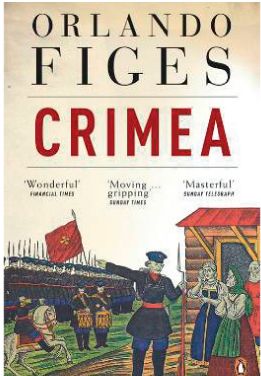Buy or gift a stand-alone digital subscription and get unlimited access to dozens of back issues for just £18.99 / $18.99 a year.
Please register at www.exacteditions.com/digital/cornucopia with your subscriber account number or contact subscriptions@cornucopia.net
Buy a digital subscription Go to the Digital Edition
The Crimean War is important for other reasons. It was the first modern war, even if its generals did not grasp this at the time. The Crimea was, Orlando Figes writes, “the first war in history to be brought about by the pressure of the press and public opinion”, a circumstance that he links to technological change: the development of the railways and the speeding up of communications. But it was also a war of religion, not just a great-power collision with a profound impact on all the countries involved. How many people realise, for example, that the fight with the bully in Tom Brown’s Schooldays reflects the British–Russian struggle?
Orlando Figes’s book on the Crimean War is the sixth hefty volume so far to emerge from a career mainly devoted to 20th-century Russia, yet it is the sort of book that takes many scholars a lifetime, using British, French and Ottoman sources as well Russian ones. What is more, it tries not to take sides, and the sufferings of both combatants and forgotten bystanders, such as the Crimean Tartars and Circassians who lost their homeland, come clearly into focus.
Both minorities figured on the edges of the war but later got painted out. Seventy-five years ago, when Harold Temperley wrote a classic account of the Crimean conflict, the Circassians got only a one-line mention and the Tartars none at all. Figes tells their story, sparing no detail of the cruel fate, virtual genocide in fact, which awaited Circassians and Tartars as a result of the expansion of Tsarist rule.
Figes is a marvellously lucid writer, and manages to compress an extraordinarily wide range of details into a narrative anyone can enjoy. Forgotten individuals speak again through brilliantly selected quotations. The account of Turkish history is fair and clear – though here and there are small slips which might be corrected in a later edition. Official executions for apostasy from Islam, as opposed to neighbourhood lynchings, were not taking place in the Turkey of the 1850s, and the last such execution happened in 1843, not 1844. One of the greatest Tanzimat statesmen, Aali or Âli, is mistakenly conflated with Mehmet Ali Pasha, a hated rival.
Several of the dates given (both for his time as chargé d’affaires in London and as foreign minister) are not quite right, and there is rather too little about his role in the peace. Elsewhere, Fuad Pasha is wrongly given as an Ottoman delegate at the Paris Conference.
Small quibbles like these should not be allowed to spoil one’s enjoyment of a magisterial account of a tragic war, one which is often spellbinding and invariably illuminating for specialist and general reader alike.
1. STANDARD
Standard, untracked shipping is available worldwide. However, for high-value or heavy shipments outside the UK and Turkey, we strongly recommend option 2 or 3.
2. TRACKED SHIPPING
You can choose this option when ordering online.
3. EXPRESS SHIPPING
Contact subscriptions@cornucopia.net for a quote.
You can also order directly through subscriptions@cornucopia.net if you are worried about shipping times. We can issue a secure online invoice payable by debit or credit card for your order.

Cornucopia works in partnership with the digital publishing platform Exact Editions to offer individual and institutional subscribers unlimited access to a searchable archive of fascinating back issues and every newly published issue. The digital edition of Cornucopia is available cross-platform on web, iOS and Android and offers a comprehensive search function, allowing the title’s cultural content to be delved into at the touch of a button.
Digital Subscription: £18.99 / $18.99 (1 year)
Subscribe now